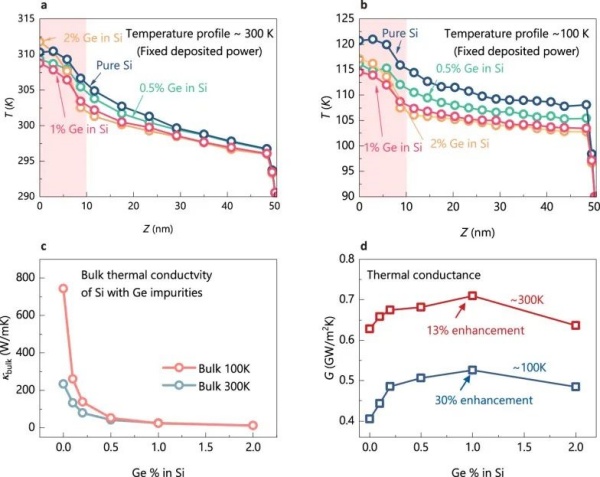Yue Hu, a Class of 2023 doctoral graduate of the University of Michigan-Shanghai Jiao Tong University Joint Institute (UM-SJTU JI, JI hereafter), has published a research paper titled “Defect scattering can lead to enhanced phonon transport at the nanoscale” as the first author in the esteemed academic journal Nature Communications. This study challenges the prevailing understanding that defect scattering reduces thermal transport in materials, revealing that at the nanoscale, precise control of directional non-equilibrium phonon transport through introducing defect scattering can significantly enhance thermal transport.


The manipulation of thermal transport is of significant importance in both fundamental scientific research and practical engineering applications. Typically, defects in materials introduce additional phonon (heat carrier) scattering, thereby introducing thermal resistance and deteriorating the efficiency of thermal transport. Therefore, in the field of developing materials with low thermal conductivity, such as thermoelectric conversion and thermal barrier coatings, introducing defects has become a common strategy. However, when pursuing high-thermal conductivity materials, such as in the realm of electronic device cooling, reducing defect scattering becomes crucial. This is typically achieved through growing high-quality crystals and isotope purification.
The published paper demonstrates that defect scattering can anomalously enhance thermal transport at the nanoscale and reveals the underlying physical mechanisms. It has been found that the key to enhancing thermal transport relies on that phonon transport in the heated region of the material remains in a ballistic transport regime, where the length of the heated region needs to be smaller than the phonon mean free path (on the scale of micrometers to nanometers). Further analysis reveals that in the absence of defects, there is over-populated oblique phonon propagation in the heated region, leading to clear directional phonon nonequilibrium. Introducing defects can alter the direction of phonon propagation through defect scattering, thereby restoring the directional equilibrium of phonon transport and ultimately enhancing thermal transport. This mechanism has been validated in a wide range of temperatures, materials, and sizes. In the case studies presented in the paper, the enhancement of thermal conductance through introducing defect scattering can reach up to 75%.
The paper not only reveals a new mechanism in the study of phonon nonequilibrium transport, namely directional phonon nonequilibrium, but also provides an unconventional strategy for enhancing thermal transport. It offers practical and effective solutions to overcome heat dissipation bottlenecks in computing chips, power devices, and quantum chips.
In addition to Yue Hu, a JI Ph.D. student enrolled in 2018, the paper’s author team also include the second author Jiaxuan Xu, a JI Ph.D. student enrolled in 2020, Professor Xiulin Ruan from Purdue University as a co-author, and SJTU Professor Hua Bao as the sole corresponding author. The paper project received the support from the National Natural Science Foundation of China. The computations in this paper were run on the π 2.0 cluster provided by the SJTU Center for High Performance Computing.
Paper link:https://doi.org/10.1038/s41467-024-47716-4
Author Introduction

Yue Hu joined the University of Michigan-Shanghai Jiao Tong University Joint Institute in 2018 and graduated with a Ph.D. degree in 2023. He won the KLA-Tencor Scholarship and the title of Outstanding Graduate of Shanghai Jiao Tong University. Currently, he is working in China Three Gorges Corporation, engaged in scientific and technological innovation.

Jiaxuan Xu graduated from Shandong University with a bachelor’s degree and joined the University of Michigan-Shanghai Jiao Tong University Joint Institute in 2020. He is currently a Ph.D. student in the group of Professor Hua Bao. He focuses on the study of nonequilibrium thermal transport at micro and nanoscales, and has published 6 articles in SCI journals. He won the Best Poster Award at the International Symposium on Multiscale Simulations of Thermophysics-2023 Conference and the Recommended Poster of Outstanding Young Scholars’ Papers at the 2022 Annual Meeting of Engineering Thermophysics.
 Hua Bao, a professor at Global Institute of Future Technology, Shanghai Jiao Tong University, received his bachelor’s degree in physics from Tsinghua University in 2006 and his Ph.D. degree in mechanical engineering from Purdue University in 2012. After that, he joined the University of Michigan-Shanghai Jiao Tong University Joint Institute and served as Assistant Professor, Associate Professor and Professor. In 2022, he joined the Global Institute of Future Technology.
Hua Bao, a professor at Global Institute of Future Technology, Shanghai Jiao Tong University, received his bachelor’s degree in physics from Tsinghua University in 2006 and his Ph.D. degree in mechanical engineering from Purdue University in 2012. After that, he joined the University of Michigan-Shanghai Jiao Tong University Joint Institute and served as Assistant Professor, Associate Professor and Professor. In 2022, he joined the Global Institute of Future Technology.

